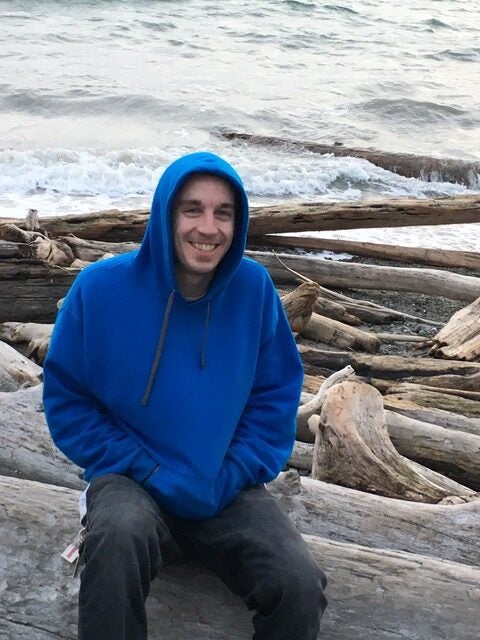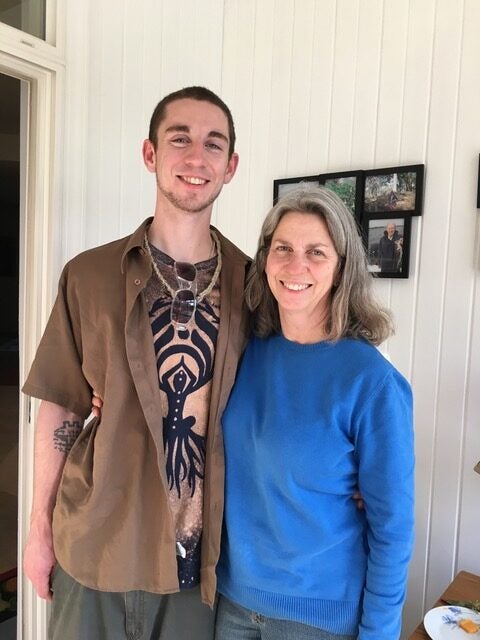In Milwaukee, a 29-year-old woman was charged with her mother’s murder after police responded to a call and found Carrie Zettel dead in her backyard last month.
The tragedy followed escalating encounters with police where Zettel’s daughter, Lauren Spors, exhibited troubling behavior indicating she was experiencing a mental health crisis. On Nov. 21, Spors was found incompetent to stand trial after showing symptoms of schizoaffective disorder.
Now, some Wisconsin mental health advocates are asking why there weren’t crisis interventions before the situation escalated.
News with a little more humanity
WPR’s “Wisconsin Today” newsletter keeps you connected to the state you love without feeling overwhelmed. No paywall. No agenda. No corporate filter.
Compared with other states, Wisconsin has an especially high legal bar to force someone to receive mental health treatment. To have someone committed, the county must show that someone is very likely to cause harm to themselves or another person. In most cases, that person must be detained by law enforcement to initiate an involuntary commitment — also known as a civil commitment.
Mary Kay Battaglia, executive director of NAMI Wisconsin, said those statutes may be too restrictive.
“We’re at a place where we’re not getting people help for fear of interfering with their rights,” Battaglia said. “I believe in people’s individual rights, and I believe in patient rights. I just think sometimes we aren’t seeing the full picture.”
But some civil rights advocates are warning against loosening those restrictions. Mental health attorney Elizabeth Rich said that Wisconsin’s civil commitment statutes are written to prevent the state from unnecessarily infringing on people’s rights. Even so, data from 2015 suggests that Wisconsin had the highest rate of civil commitment in the country at that time.
“I think our statutory scheme is among the best,” Rich said in an interview with WPR’s “Wisconsin Today.” “But the way it’s being enforced currently in Wisconsin is too zealous.”
Who can be committed to involuntary treatment in Wisconsin?
Most civil commitments in Wisconsin begin one of two ways: emergency detention by law enforcement or, less frequently, a petition signed by three adults. But to actually commit someone for the standard six month period, the county or petitioners must provide clear and convincing evidence that a person is mentally ill and a danger to themselves or others.
“It is a very difficult situation for families to be in,” Battaglia said. “The thing that’s so distressing for most people is you can’t really do anything until it’s a crisis.”
Rich pointed out some major differences between being found guilty in the criminal system and being committed in the civil system.
“In order to incarcerate someone under the civil system, they just need clear and convincing evidence, rather than (proof) beyond a reasonable doubt,” Rich said. “But also, the length of confinement can be virtually indefinite.”
When a person is committed in Wisconsin, they may be admitted into a community or state inpatient facility, or they may be put on a court-ordered outpatient care plan called Assistant Outpatient Treatment.
“We’re always looking at the least restrictive intervention that we can implement to ensure safety and meet the person’s treatment needs,” said Sarah Henrickson, clinical team manager with Journey Mental Health’s Emergency Services Unit in Dane County.
 The exterior of Journey Mental Health Center in Madison. Photo courtesy of Journey Mental Health Center
The exterior of Journey Mental Health Center in Madison. Photo courtesy of Journey Mental Health Center
After the initial six month period of commitment, the county will hold a recommitment hearing, where they decide whether a person should continue to receive mandated treatment. Rich said the repeated recommitments she’s seen when representing civil clients is an abuse of the original intent of the law.
“The idea is we provide treatment until a person can then manage independently and get off of the commitment,” Rich said. “But too often that doesn’t happen, and we just recommit and recommit.”
‘He didn’t see an end to it’
Rich wasn’t always a mental health attorney — witnessing the civil commitment process firsthand brought her into the field.
In 2017, Rich’s adult son Andrew was detained by law enforcement after he was found naked and howling at the moon on a golf course in Kohler. He wasn’t being violent, Rich said, but police officers tased him multiple times and emergency medical personnel injected him with a high dose of ketamine.
 Andrew Rich on a family trip to Seattle in 2017. Several months later, Andrew was detained by law enforcement during a mental health crisis. Photo courtesy of Elizabeth Rich
Andrew Rich on a family trip to Seattle in 2017. Several months later, Andrew was detained by law enforcement during a mental health crisis. Photo courtesy of Elizabeth Rich
The police filed charges against Andrew for resisting an officer and disorderly conduct. He was faced with a choice: be tried in a criminal court or go through the civil commitment process and be admitted to a psychiatric hospital.
“Initially I was very supportive (of civil commitment), as a concerned mother,” Rich said. “He had been free of drugs for quite some time — several years — so I was very pleased about his progress and concerned that he would be facing criminal charges again.”
Andrew was committed to the Winnebago Mental Health Institute, where he was subject to restraints and involuntary injections of antipsychotic medication. Rich said those experiences were extremely traumatic for her son.
Andrew moved from the institute to a halfway house, and then into an apartment. Rich said Andrew was doing well — he was living independently and working at a job where he was getting raises and promotions. But he wanted his commitment to be over, as the medication he was being ordered to take felt to Andrew and Elizabeth like he was being “chemically lobotomized.”
“He was drooling and incoherent sometimes,” Rich said. “He couldn’t live a normal life. He couldn’t laugh, he couldn’t cry, and he was miserable.”
At his six month recommitment hearing, his psychiatrist testified that Andrew wouldn’t admit that he was mentally ill and needed medication. He was recommitted.
As an attorney, Rich was shocked by the hearing.
 Andrew Rich and his mother, Elizabeth. Elizabeth was driven to focus on mental health law after her son was placed in a civil commitment. Photo courtesy of Elizabeth Rich
Andrew Rich and his mother, Elizabeth. Elizabeth was driven to focus on mental health law after her son was placed in a civil commitment. Photo courtesy of Elizabeth Rich
“Before they take away a person’s civil liberty, it’s the county’s burden to prove that a person is mentally ill and dangerous,” Rich said. “Doesn’t this flip that burden (of proof) if the person is required to prove a negative — that despite this incident years ago, (they’re) now okay?”
After two and a half years, Andrew attended his third recommitment hearing, where he asked the judge whether his commitment would ever end. According to Rich, the judge told Andrew to just keep doing what he was doing.
Andrew died by suicide just weeks after the hearing.
“He didn’t see an end to it, and he didn’t want to live that way anymore,” Rich said.
Rich pointed out that if Andrew had been tried in a criminal court, he likely would have been incarcerated for a short period of time, if at all.
“He would have been done and over with it in 30 days or less,” Rich said. “What he wound up with was being forcibly medicated for two and a half years.”
Critics disagree on how to reform civil commitment
Rich hopes to see patient rights become a bigger issue in commitment hearings, where she sees medical opinions being the deciding factor.
“What’s happening now is we have a doctor’s report and the judges rubber stamp it. It’s very rare to see it scrutinized in any way,” Rich said. “If that’s all that matters, if the judge has no say … then why are they involved?”
She also thinks treatment and medication plans should be tailored more to individual patients. The Wisconsin Supreme Court is currently weighing the issue of court-ordered medication in criminal cases, but it remains solidly in place in civil cases.
On the other side of the issue, Battaglia thinks the requirements to commit someone should be loosened to help more people get treatment. She suggested allowing medical professionals to initiate commitments, and using inability to care for oneself as a reason for commitment more often. But Battaglia said that capitalizing on when a person wants to get help voluntarily would be ideal.
“I think the best opportunity is peer support, where people can talk to each other that have experienced this in the past — making those relationships through community services, through clubhouses and through drop-in centers, if you can get them to go there,” Battaglia said. “I think we just need to do a better job of having those social services.”
Henrickson, with Journey Mental Health, agreed that the high legal bar for civil commitment is a barrier to some people getting treatment. But she encouraged Wisconsin communities to consider whether people who are struggling might need material and social support before taking legal action.
“We need to have statutory limits and constitutional protections so that we don’t swing the pendulum so far the other way that people are easily being committed to involuntary psychiatric treatment… simply because they lack social services or resources that they need to manage their lives or because they don’t have access to appropriate mental health care,” Henrickson said.
If you or someone you know is in a mental health crisis, you can call or text the three-digit Suicide and Crisis Lifeline at 988. Resources are also available online here. You can also call your county crisis line.
